Who is Dominic Cummings? From Boris Johnson’s key confidant to worst enemy
The man who helped the Tories achieve their landslide victory is ready to turn on the PM
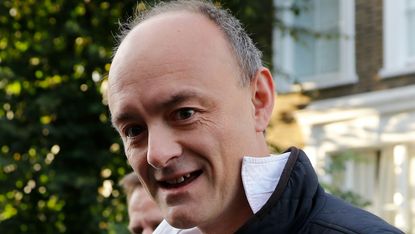
The prime minister’s former top aide Dominic Cummings will give evidence to MPs tomorrow in what has already been billed as “one of the most remarkable moments in modern political history”.
Downing Street insiders are said to be concerned about the “treasure trove” of information he has gleaned from his time as Boris Johnson’s right-hand man.
He ran the pro-Brexit Vote Leave campaign, is credited with delivering the Tories their landslide victory in 2019 and was famously described by former prime minister David Cameron as a “career psychopath”.
Subscribe to The Week
Escape your echo chamber. Get the facts behind the news, plus analysis from multiple perspectives.

Sign up for The Week's Free Newsletters
From our morning news briefing to a weekly Good News Newsletter, get the best of The Week delivered directly to your inbox.
From our morning news briefing to a weekly Good News Newsletter, get the best of The Week delivered directly to your inbox.
Here’s what else we know about the man who switched from being the PM’s closest adviser to a dangerous adversary:
Early life
Cummings attended the then-all boys Durham boarding school before going on to study history at Exeter College, Oxford.
After graduating in 1994 he moved to Soviet Russia, where he spent three years working on what he refers to as “various projects”.
“I’m not claiming I was good at anything,” he has said of this period, “but working in nightclubs and starting businesses in Russia counts as ‘the real world’.”
However, according to The Guardian, the nightclub belonged to his uncle, and his Russian business was an airline that “folded after its first flight left without a single passenger”.
In 1998, Cummings took up a role as head of research for Business for Sterling - the campaign against Britain joining the euro - where his aggressive and unconventional working practices quickly drew attention.
Political career
In 2002, Cummings was appointed director of strategy by then Conservative Party leader Iain Duncan Smith.
But “after eight months in the job he quit, pronounced Mr Duncan Smith ‘incompetent…a worse prime minister than Tony Blair’, and retired to an underground bunker in Durham to study Russian literature and Thucydides”, says The Economist.
Cummings went on to work for Michael Gove between 2007 and 2014, first in opposition and then as a special adviser in the Department for Education. Here, Cummings was known for his “volcanic outbursts”, while his work was described as “either mad, bad or brilliant – and probably a bit of all three”, as The Guardian reported at the time.
In a further public show of temper, in 2017, Cummings branded then Brexit secretary David Davis “thick as mince” and “lazy as a toad”, according to The Independent.
Vote Leave
Cummings became campaign director for Vote Leave when the campaign launched in October 2015, and has been hailed as a key player in the Brexit movement.
He coined the catchphrase “Vote Leave, Take Control”, after realising that this message was “more seductive” than the group’s initial legal name Vote Leave, Get Change, says the Financial Times.
Cummings also invented the “£350m a week for the NHS” slogan that was plastered on the side of a campaign bus, and appeared unrepentant when the claim was subsequently discredited.
“Would we have won without immigration? No,” he said in 2017. “Would we have won without £350m/NHS? All our research and the close result strongly suggests no.
“Would we have won by spending our time talking about trade and the single market? No way.”
Despite Cummings’ EU referendum successes, he remained unpopular with fellow Brexiteer Nigel Farage.
“He thinks we’re all cretins and members of the lower order,” Farage told The Times after Cummings was appointed as Johnson’s Brexit chief at No. 10. “He has never liked me. He can’t stand the ERG [European Research Group]. I can’t see him coming to any accommodation with anyone. He has huge personal enmity with the true believers in Brexit.”
In a post-referendum Twitter exchange, Cummings branded the initial referendum a “dumb idea” and said Brexit might be “an error”, says The Independent.
His role in the EU vote was the focus of 2019 Channel 4 drama Brexit: The Uncivil War, in which he is played by Benedict Cumberbatch.
In and out of Downing Street
Cummings was one of Johnson’s first appointments as PM, despite having previously criticised the Conservative Party in public. In 2017, he said: “Tory MPs largely do not care about these poorer people. They don’t care about the NHS. And the public has kind of cottoned on to that.”
But that didn’t deter him from signing up as Johnson’s closest adviser and key strategist, helping to deliver the Tories’ biggest majority since Margaret Thatcher.
Johnson’s subsequent illegal prorogation of Parliament and “the prime minister’s abrasive messaging all have the hallmarks of the Cummings’ new Westminster playbook”, said Politico at the time.
It was this “disciplined, on-message election campaign” run by Cummings that “sealed the deal”, added the news site.
The strategy guru - who reportedly used to have an hour-long phone call with the PM every morning - was photographed at Johnson’s side looking jubilant on election night as the results came in. And, not long after, the Tories “got Brexit done”.
Next on the agenda, Cummings wanted to shake up the civil service, and in January 2020 called for “weirdos and misfits with odd skills” to apply for jobs within No. 10. But before the new government could begin working on many of its non-Brexit manifesto pledges, coronavirus hit.
As the country was put under unprecedented restrictions to stop the spread of the virus, Cummings found himself at the centre of a lockdown breach row after driving 260 miles from his home to Durham in March 2020. Two months later, in Downing Street’s rose garden, he defended his actions, saying he was concerned that he and his wife, The Spectator’s Mary Wakefield, were about to get seriously ill with Covid and needed his family to care for their child. However, he was widely ridiculed for saying he drove 25 miles from his parents’ home in Durham with his family to Barnard Castle to test his eyesight before driving back to London.
Johnson nevertheless stuck by Cummings, but by November the adviser had been booted out of Downing Street amid rumours he had briefed against the prime minister. In blogs and tweets since his sacking, he has attacked No. 10 as incompetent, “mad” and “unethical”, hinting that he can shine a light on what was going on behind closed doors as the pandemic took hold.
Aides in Downing Street “know he has nothing to lose” as he heads into a hearing called by the Commons select committees on health and science tomorrow, says Tim Shipman at The Sunday Times. The scene, he says, “promises to be one of the most remarkable moments in modern political history, when the two men who have done most to shape British politics over the past five years collide”.
Create an account with the same email registered to your subscription to unlock access.
Sign up for Today's Best Articles in your inbox
A free daily email with the biggest news stories of the day – and the best features from TheWeek.com
-
 'Good riddance to the televised presidential debate'
'Good riddance to the televised presidential debate'Instant Opinion Opinion, comment and editorials of the day
By Harold Maass, The Week US Published
-
 Caitlin Clark the No. 1 pick in bullish WNBA Draft
Caitlin Clark the No. 1 pick in bullish WNBA DraftSpeed Read As expected, she went to the Indiana Fever
By Peter Weber, The Week US Published
-
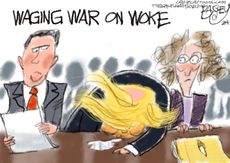 Today's political cartoons - April 16, 2024
Today's political cartoons - April 16, 2024Cartoons Tuesday's cartoons - sleepyhead, little people, and more
By The Week US Published
-
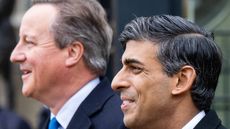 Is David Cameron overshadowing Rishi Sunak?
Is David Cameron overshadowing Rishi Sunak?Talking Point Current PM faces 'thorny dilemma' as predecessor enjoys return to world stage
By The Week UK Published
-
 How will honeytrap scandal change Westminster?
How will honeytrap scandal change Westminster?Today's Big Question Security procedures laid bare by spear phishing attack as focus shifts to 'political insider' being responsible
By The Week UK Published
-
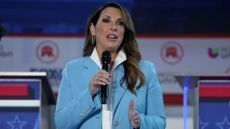 Ronna McDaniel, the former RNC chair and departed NBC analyst, may be signaling a shift in corporate media
Ronna McDaniel, the former RNC chair and departed NBC analyst, may be signaling a shift in corporate mediaThe Explainer McDaniel joined NBC less than a month after stepping down from the RNC — and was out days later
By Justin Klawans, The Week US Published
-
 Will Aukus pact survive a second Trump presidency?
Will Aukus pact survive a second Trump presidency?Today's Big Question US, UK and Australia seek to expand 'game-changer' defence partnership ahead of Republican's possible return to White House
By Sorcha Bradley, The Week UK Published
-
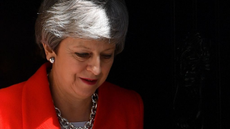 Farewell to Theresa May: a PM consumed by Brexit
Farewell to Theresa May: a PM consumed by BrexitTalking Point Maidenhead MP standing down at next general election
By The Week UK Published
-
 Britain's biggest political donors
Britain's biggest political donorsThe Explainer With the 2024 general election set to be the highest-spending contest ever we look at who is giving to which party and why
By The Week UK Published
-
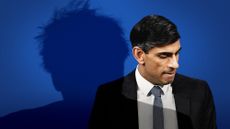 Can Boris Johnson save Rishi Sunak?
Can Boris Johnson save Rishi Sunak?Today's Big Question Former PM could 'make the difference' between losing the next election and annihilation
By The Week UK Published
-
 Badenoch, Johnson or 'full Trump': who is the future of the Tory Party?
Badenoch, Johnson or 'full Trump': who is the future of the Tory Party?Today's Big Question Tory moderates are preparing to do battle with the right of the party in a post-Sunak leadership election
By Sorcha Bradley, The Week UK Published